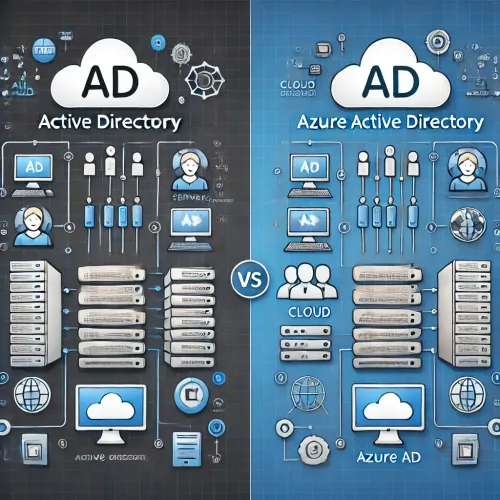
Knowledge base
August 15, 2024
Active Directory vs. Azure Active Directory: What’s the Difference?
In the world of IT and network management, Active Directory (AD) and Azure Active Directory (Azure AD) are two essential terms that are often confused.
Although they are both directory services, they differ significantly in function, application and technology.
In this blog, we will dive deep into the differences, benefits and proper applications of both systems.
What is Active Directory? ????️
Active Directory is a service that has been around since the 1990s and is used in on-premises networks.
It provides a wide range of features for managing network environments within organizations.
- Core tasks:
- Authentication: Manages user authentication within a network.
- Authorization: Determines which users have access to which resources.
- Organizational units: Used to group users and resources for easy management.
- Advantages:
- Proven technology: Decades of use and refinement.
- Broad support: Compatible with a wide range of applications and services.
- Complete control: Administrators have complete control over the infrastructure.
- Use scenarios:
- Ideal for companies with on-premises servers.
- Suitable for networks that have little to no connection to the cloud.
What is Azure Active Directory?
☁️
Azure Active Directory is a cloud-based identity and access management solution from Microsoft, designed specifically for managing user identities and access in cloud environments.
- Core tasks:
- Single Sign-On (SSO): Users can access multiple cloud applications with one set of login credentials.
- Identity Management: managing identities and access rights in the cloud.
- Integration with Microsoft 365: Seamless integration with all Microsoft 365 applications and other SaaS solutions.
- Advantages:
- Scalability: Grows with your organization without having to adjust your infrastructure.
- Cloud-native: Designed to perform optimally in the cloud.
- Security: Advanced security features such as Multi-Factor Authentication (MFA) and Conditional Access.
- Use scenarios:
- Perfect for organizations using cloud solutions such as Microsoft 365 and other SaaS applications.
- Ideal for companies that have a hybrid cloud environment.
Key Differences ????
Although both are directory services,
Active Directory and
Azure Active Directory have different uses and benefits:
- Infrastructure:
- AD: On-premises, works on physical or virtual servers within your own network.
- Azure AD: Cloud-based, works over the Internet and does not require on-premises servers.
- Scope:
- AD: Traditional networks with on-premises servers.
- Azure AD: Modern cloud-based networking and hybrid environments.
- Management:
- AD: Requires more hands-on management and maintenance of servers.
- Azure AD: Less maintenance required, Microsoft manages the underlying infrastructure.
- Costs:
- AD: Costs can be high due to the need for physical servers and maintenance.
- Azure AD: More flexible costs, pay-as-you-go model.
Conclusion: What Fits Your Organization? ????
The choice between Active Directory and Azure Active Directory depends heavily on your current IT infrastructure and your future plans.
If your organization operates primarily on-premises and has no immediate cloud plans, AD may still be the right choice.
But for organizations that use cloud solutions, such as Microsoft 365, or have plans to migrate to the cloud, Azure AD offers a modern and efficient solution. In a nutshell:
- Choose AD if you stay on-premises.
- Go for Azure AD if you are making or have already made the move to the cloud.
Choosing the right directory service will ensure that your IT infrastructure is secure, scalable and future-proof.
Want to know more?

Related blogs
Tech Updates: Microsoft 365, Azure, Cybersecurity & AI – Wekelijks in je Mailbox.



